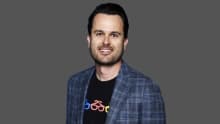Tech titan Guy Kawasaki on growth, grit and grace

Human creativity is more than just the fire that humans stoke in their gut whenever they chase after their passion and interests.
As we learned from our conversation with Guy Kawasaki, the famed Chief Evangelist of Canva and earlier of Apple, and now host of the podcast, Remarkable People, there’s something deeper and more profound that emanates from this expression of ideas and pursuit of a higher call.
Human creativity – expressed as growth, grit and grace – can become an engine of change.
The same fire that consumes us in our pursuit of our individual desires is also what propels us to make a difference in the world. That’s a lesson that resonates from the hundreds of stories about remarkable people that Guy has interviewed over the years.
Guy, how do you draw out the best stories and insights from remarkable people?
Well, some of it is just preparation. I read their book, I watch their videos, or spend three, four or five hours preparing for a one-hour call. On top of that, honestly, my secret sauce is I have 40 years of working on the frontlines.
[For the podcast], we conducted these 200 and something episodes, and we've interviewed very remarkable people. We have had Jane Goodall, Steve Wozniak, Neil deGrasse Tyson, Angela Duckworth. Absolutely remarkable people.
I began to notice patterns which led me to want to write the book. And so we figured out, let's distil this down. We set ourselves a limit of 200 pages. So I can tell you that my book is 170 pages long and there are 88 tactics explained on how to make a difference and be remarkable.
You mentioned before that if people say they go after their passion, you suggest that they instead pursue their interests. How does this play into being remarkable?
I think that the expectation to find your passion creates problems because it implies that one day you're going to discover your passion. It's going to be love at first sight and you're going to dedicate your life to it.
So you try a lot of things. Some of these things take root; some don't. To go through life saying, “I gotta find this passion,” you're setting yourself up for failure. That's too high a bar. Just find some interesting things and try them and play with them and explore them.
You've worked in some iconic companies. When you look at the world of work today, how do you see work changing?
That's a hard question for me to answer because I have not worked as an employee for decades. So I'm on the outside looking in. I don't know how work is going to go into the future.
I will make one statement though – that diversity is good. Diversity of gender, sexual orientation, race, religion, height, weight, skin colour, expertise. I think that the more diverse a company, the stronger the company. If you're all the same, then you're going to all think the same and you're going to all make the same mistakes.
If I were looking for a job today, I think one of the most important things [I would look for] is that the company supports a growth mindset.
A growth mindset says that people can learn. They can learn new skills, new tactics, new passions, new interests. And one of the great clues that a company thinks like that is that they have diversity programmes, and they have training and they have ways that employees can improve themselves.
A big component of having a growth mindset is learning from failures. How do you view failure, and how do you deal with setbacks?
The flip side of any failure is that it's a learning opportunity. Now, don't get me wrong. That's a really nice quote for a picture on the wall.
Failure is painful and traumatic. You should do everything you can to avoid failure. You should do everything you can not to fail.
Now, in doing everything you can not to fail, you will still fail. What you need to do is to learn from that failure, so you don't fail again. Or at least, if you fail again, you will fail in a different way.
I've had products that failed. I've had books that failed. I've had speeches that failed. It just comes with the territory. After a while, you realise that it's not how often you fail but how often you succeed. You could fail five times but, if on the sixth time, you create a great, successful company, nobody cares about the first five times.
What can HR and talent leaders take away from your new book, Think Remarkable?
If you believe that employees can constantly improve, constantly gain new skills, and constantly gain new abilities, then this book will help you help them achieve that goal.
On the other hand, if you're an HR leader and you believe that, once you recruit a genius, that person is ever going to remain a genius and you don't have any work to do, or that person is done and all you have to do is keep them employed, then this book is probably not for you.
This book is for people who want to use it as a tool to get a remarkable workforce – and that takes work. These are ways to use growth, grit, and grace to become a better employee.
It takes a long time to be remarkable. Focus on making a difference. You don't have to be Jane Goodall or Steve Jobs. You don't need to be a trillionaire or sell hundreds of millions of computers. You just need to make a difference. It could be to one client, one student, one team.
The way you get to be remarkable is not by trying to be remarkable. You get to be remarkable by making a difference.
Image source: CNBC






